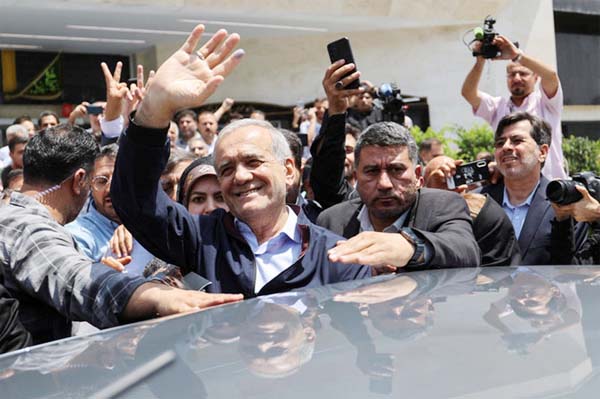Khamenei protege, sole moderate neck and neck in Iran presidential race

Reuters :
A low-key moderate and a protege of Iran’s supreme leader are neck-and-neck in the vote count in snap presidential elections marked by voter apathy over economic hardships and social restrictions.
More than 14 million votes have been counted so far from Friday’s vote, of which the sole moderate candidate Massoud Pezeshkian had won over 5.9 million votes and his hardline challenger former nuclear negotiator Saeed Jalili over 5.5 million, provisional results by the interior ministry showed.
Some insiders said the turnout was around 40 percent, lower than expected by Iran’s clerical rulers, while witnesses said that polling stations in Tehran and some other cities were not crowded.
Iran’s Tasnim news agency said a run-off election was “very likely” to pick the next president following the death of Ebrahim Raisi in a helicopter crash last month.
If no candidate wins at least 50 percent plus one vote from all ballots cast, including blank votes, a run-off between the top two candidates is held on the first Friday after the result is declared.
The election coincides with escalating regional tension due to the war between Israel and Iranian allies Hamas in Gaza and Hezbollah in Lebanon, as well as increased Western pressure on Iran over its fast-advancing nuclear program.
While the election is unlikely to bring a major shift in the Islamic Republic’s policies, its outcome could influence the succession to Ayatollah Ali Khamenei, Iran’s 85-year-old supreme leader, in power since 1989.
The clerical establishment sought a high turnout to offset a legitimacy crisis fueled by public discontent over economic hardship and curbs on political and social freedom.
The next president is not expected to usher in any major policy shift on Iran’s nuclear program or support for militia groups across the Middle East, since Khamenei calls all the shots on top state matters.
However, the president runs the government day-to-day and can influence the tone of Iran’s foreign and domestic policy.
Pezeshkian’s views offer a contrast to those of Jalili, advocating detente with the West, economic reform, social liberalization and political pluralism.
A staunch anti-Westerner, Jalili’s win would signal the possibility of an even more antagonistic turn in the Islamic Republic’s foreign and domestic policy, analysts said.
LIMITED CHOICES
The election was a contest among a tightly controlled group of three hardline candidates and one low-profile moderate loyal to the supreme leader. A hardline watchdog body approved only six from an initial pool of 80 and two hardline candidates subsequently dropped out.
